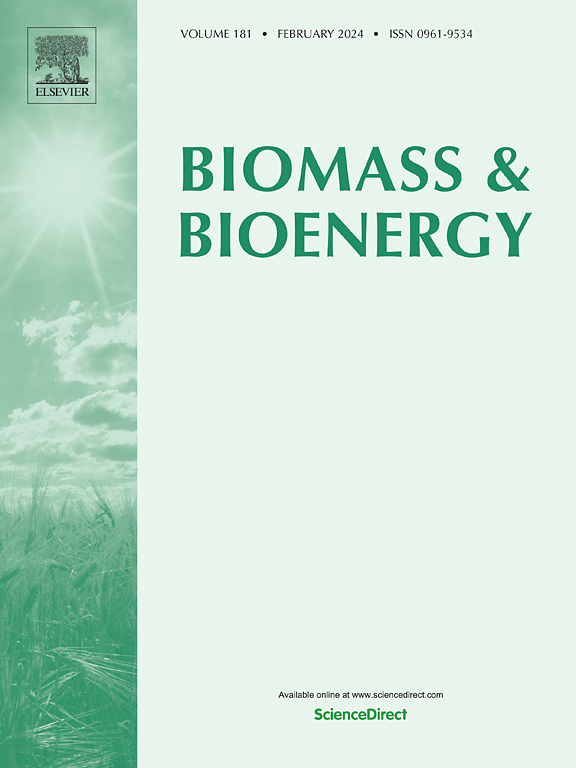ZnO/Cu-BTC金属有机骨架作为多相催化剂将废食用油高效转化为生物柴油
IF 5.8
2区 生物学
Q1 AGRICULTURAL ENGINEERING
引用次数: 0
摘要
金属有机骨架(mof)因其具有孔隙率大、比表面积大、可调节等独特的性能,在催化领域被广泛认为是一种很有前途的材料。本研究以1,3,5-苯三羧酸酯(BTC)为原料,用氧化锌(ZnO/Cu-BTC)改性铜基mof,制备了简便高效的多相催化剂,并将该复合材料用于以废食用油(WCO)为原料生产生物柴油。采用XRD、SEM、TEM、FTIR、TGA、N2吸附-解吸等表征技术对催化剂进行分析,并将催化剂用于WCO制生物柴油。我们使用GC-MS和NMR对所得生物柴油进行了表征。ZnO/Cu-BTC催化剂在负载4 wt%、甲醇/WCO摩尔比为20:1、温度160℃、反应4 h的最佳条件下,生物柴油转化率为92.4%。这种效率归因于双金属组分的协同作用,以及表面性能的增强。此外,ZnO/Cu-BTC催化剂表现出优异的耐久性,即使经过三个反应循环,转化率也保持在84.1%。动力学研究表明,转化为生物柴油是通过准一级动力学进行的。与已有的固体催化剂相比,ZnO/ Cu-BTC催化剂具有较好的WCO生物柴油转化率。生物柴油符合ASTM6751燃料标准,表明性能成功。最后,本研究结果表明ZnO/ Cu-BTC催化剂是WCO转化为生物柴油的有效固体催化剂。本文章由计算机程序翻译,如有差异,请以英文原文为准。

ZnO/Cu-BTC metal-organic frameworks as a heterogeneous catalyst for efficient transformation of waste cooking oil into biodiesel
Metal-organic frameworks (MOFs) are widely regarded as promising materials in the field of catalysis due to their unique properties, including large porosity, high surface area, and adjustable properties. In this study, facile and efficient heterogeneous catalysts were prepared by modification of a copper-based MOFs constructed from 1,3,5-benzenetricarboxylate (BTC) with zinc oxide (ZnO/Cu-BTC), and the composite was applied as a catalytic agent for biodiesel production using waste cooking oil (WCO) as the feedstock. Characterization techniques, such as XRD, SEM, TEM, FTIR, TGA and N2 adsorption-desorption, were employed to analyze the catalyst, which was then used for the conversion of WCO into biodiesel. We characterized the resulting biodiesel using GC-MS and NMR. The ZnO/Cu-BTC catalyst exhibits an impressive biodiesel conversion of 92.4 % under optimum conditions of 4 wt% catalyst loading, 20:1 methanol/WCO molar ratio at 160 °C for 4 h. This efficiency is ascribed to the synergistic action of the bimetallic components, coupled with enhanced surface properties. Additionally, ZnO/Cu-BTC catalyst showed excellent durability, maintaining 84.1 % conversion even after three reaction cycles. Kinetics investigation showed that the transformation to biodiesel proceeds via pseudo-first order kinetics. In comparison with other solid catalysts reported in previous studies, ZnO/Cu–BTC catalyst showed good WCO biodiesel conversion. The biodiesel conformed to ASTM6751 fuel standards, indicating successful performance. Finally, the results presented in this study show that ZnO/Cu–BTC catalyst is an effective solid catalyst for the conversion of WCO to biodiesel.
求助全文
通过发布文献求助,成功后即可免费获取论文全文。
去求助
来源期刊

Biomass & Bioenergy
工程技术-能源与燃料
CiteScore
11.50
自引率
3.30%
发文量
258
审稿时长
60 days
期刊介绍:
Biomass & Bioenergy is an international journal publishing original research papers and short communications, review articles and case studies on biological resources, chemical and biological processes, and biomass products for new renewable sources of energy and materials.
The scope of the journal extends to the environmental, management and economic aspects of biomass and bioenergy.
Key areas covered by the journal:
• Biomass: sources, energy crop production processes, genetic improvements, composition. Please note that research on these biomass subjects must be linked directly to bioenergy generation.
• Biological Residues: residues/rests from agricultural production, forestry and plantations (palm, sugar etc), processing industries, and municipal sources (MSW). Papers on the use of biomass residues through innovative processes/technological novelty and/or consideration of feedstock/system sustainability (or unsustainability) are welcomed. However waste treatment processes and pollution control or mitigation which are only tangentially related to bioenergy are not in the scope of the journal, as they are more suited to publications in the environmental arena. Papers that describe conventional waste streams (ie well described in existing literature) that do not empirically address ''new'' added value from the process are not suitable for submission to the journal.
• Bioenergy Processes: fermentations, thermochemical conversions, liquid and gaseous fuels, and petrochemical substitutes
• Bioenergy Utilization: direct combustion, gasification, electricity production, chemical processes, and by-product remediation
• Biomass and the Environment: carbon cycle, the net energy efficiency of bioenergy systems, assessment of sustainability, and biodiversity issues.
 求助内容:
求助内容: 应助结果提醒方式:
应助结果提醒方式:


